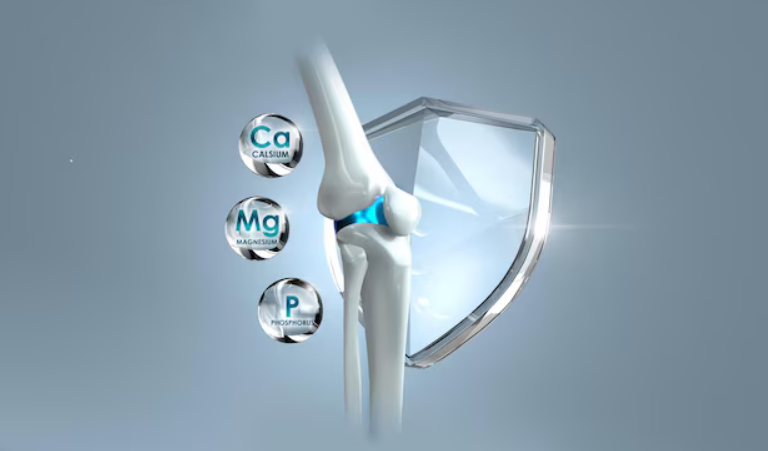Natural Methods for Increasing Bone Health: An Overview of Bone Health
Bones serve many vital purposes throughout the human body, making them essential to overall health. In addition to providing our bodies with structural support, which enables movement and proper posture, bones also house and protect important organs. The 206 bones of adults form their skeletal system, organised into a sophisticated framework that gives strength and rigidity.
Anatomically, bones consist of a dense matrix of connective tissue. Collagen and other minerals, such as calcium and phosphorus, primarily make up this matrix. This structure gives bones their strength and allows them to maintain a complex balance between toughness and flexibility. As a result, bones can endure significant strain. Furthermore, bones are dynamic and undergo continuous remodelling. In this process, old bone tissue is replaced with new tissue, ensuring that the skeleton remains durable over time.
Why Bone Health Is Crucial as People Age
As people age, bone health becomes increasingly crucial due to diseases such as osteoporosis. This illness is characterised by decreased bone density and increased fragility. Bone health is also impacted by fractures, which often result from falls or severe impacts. Lifestyle choices, including smoking, excessive alcohol consumption, and physical activity, significantly affect bone density and strength. Additionally, dietary choices are important, as maintaining bone health requires sufficient intake of calcium and vitamin D.
Maintaining Bone Health Throughout Life
People can maintain bone health throughout their lives by making informed decisions based on an understanding of bone anatomy and physiology. By addressing modifiable risk factors and using bone-strengthening techniques, people can increase their bone density and reduce their risk of osteoporosis and fractures. This ultimately leads to better overall health and vitality.

Food for Healthy Bones
A proper diet is closely related to maintaining healthy bones. It provides vital nutrients necessary for bone formation and maintenance. Key vitamins and minerals that support bone health include calcium, vitamin D, magnesium, and vitamin K. Calcium plays a major role in bone formation, making it perhaps the best-known nutrient in this context. The recommended calcium intake varies according to age and gender. For most individuals, it ranges from 1,000 to 1,200 mg. Dairy products, fortified plant-based milk, leafy greens, and certain seafood are excellent sources.
Important Nutrients for Bone Health
- Vitamin D is also crucial, as it aids calcium absorption. Insufficient vitamin D can lead to weak, brittle bones. The general recommendation for adults is to consume 600–800 IU per day. Good sources of vitamin D include egg yolks, fatty seafood, sun exposure, and fortified foods.
- Magnesium: Adequate magnesium intake, ranging from 310 to 420 mg for adults, supports bone structure and health. Magnesium is found in foods like green leafy vegetables, whole grains, nuts, and seeds.
- Vitamin K: Vitamin K is another essential mineral that helps regulate calcium within the bones. Adults should consume about 90 to 120 mcg of vitamin K daily. The majority of this vitamin is found in green leafy vegetables such as broccoli, spinach, and kale.
Best Food Sources for Bone Health
To improve bone health effectively, it is advisable to follow a balanced diet that includes a variety of these food sources. However, certain dietary habits can negatively affect bone health. Excessive consumption of alcohol, salt, and caffeine can contribute to bone loss. Limiting these substances while ensuring adequate intake of nutrient-dense foods is a smart approach for maintaining long-term bone health.
Exercise and Bone Density
Regular physical exercise is essential for preserving and improving bone health. It plays a crucial role in the body’s continuous remodelling of bone tissue. Various forms of exercise, such as resistance training, weight-bearing activities, and balance-focused exercises, significantly influence bone density and strength.
Weight-Bearing Exercises for Bone Strength
Weight-bearing activities like walking, running, and dancing require bones to support the body’s weight. These exercises promote the formation of new bone tissue, resulting in increased bone density. Research shows that engaging in consistent weight-bearing activities reduces the risk of developing osteoporosis later in life. This highlights the importance of incorporating such exercises into a regular routine.
The Role of Resistance Training in Bone Health
Resistance training also contributes to strengthening bones. Lifting weights or using resistance bands helps stimulate bone production by applying stress to the bones. As muscles grow stronger, they exert force on the bones, reinforcing their structure and density. This makes resistance training crucial, especially for older adults, to prevent bone loss and maintain bone health.

Balance-Focused Exercises to Prevent Falls
In addition to weight-bearing and resistance exercises, balance-focused activities like yoga and Tai Chi are beneficial. These exercises not only enhance stability and coordination but also help prevent falls. Reducing the risk of falls is crucial, as they can result in fractures, particularly in individuals with weakened bones.
Staying Active: Avoiding Sedentary Behaviour
Avoiding sedentary behaviour is equally important. Prolonged inactivity can lead to bone deterioration. Regular movement supports bone health and contributes to overall physical fitness. To develop an effective exercise regimen that supports bone health, people should aim for at least 150 minutes of moderate-intensity aerobic activity combined with strength training exercises on two or more days each week. This comprehensive strategy improves overall physical wellbeing as well as bone health.
Changes in Lifestyle for Improved Bone Health
Maintaining optimal bone health is a complex process that involves more than just diet and exercise. Several lifestyle changes can significantly contribute to maintaining and improving bone density, strength, and overall skeletal health. One of the most important factors is maintaining a healthy weight. Being either higher weight or underweight can negatively impact bone health. Excess weight can increase the risk of fractures due to falls, while being underweight may lead to decreased bone density. A balanced approach to weight management is essential, promoting a healthy lifestyle through nutritious eating and regular physical activity.
The Importance of Quitting Smoking for Bone Health
Quitting smoking is another key step in supporting healthy bones. Research shows that smoking reduces bone density and increases the risk of osteoporosis. The chemicals in tobacco disrupt the body’s ability to absorb calcium and affect hormone levels necessary for bone health. Therefore, quitting smoking benefits not only the lungs and cardiovascular system but also plays a vital role in maintaining bone health.
Managing Stress for Stronger Bones
Managing stress effectively is also important for maintaining strong bones. Chronic stress increases cortisol levels, which can contribute to bone loss. Stress-reduction techniques such as mindfulness, yoga, or meditation can improve both mental and physical health by reducing the negative impact on the skeletal system.

Regular Bone Health Screenings
In addition to these lifestyle changes, regular bone health assessments are essential. Government-recommended screenings can help identify early signs of bone density loss, enabling timely intervention. Getting adequate sun exposure is also important, as sunlight helps the body produce vitamin D, which is necessary for calcium absorption. Finally, incorporating habits that support bone health and sufficient calcium intake into daily routines can empower individuals to effectively manage their bone health.
